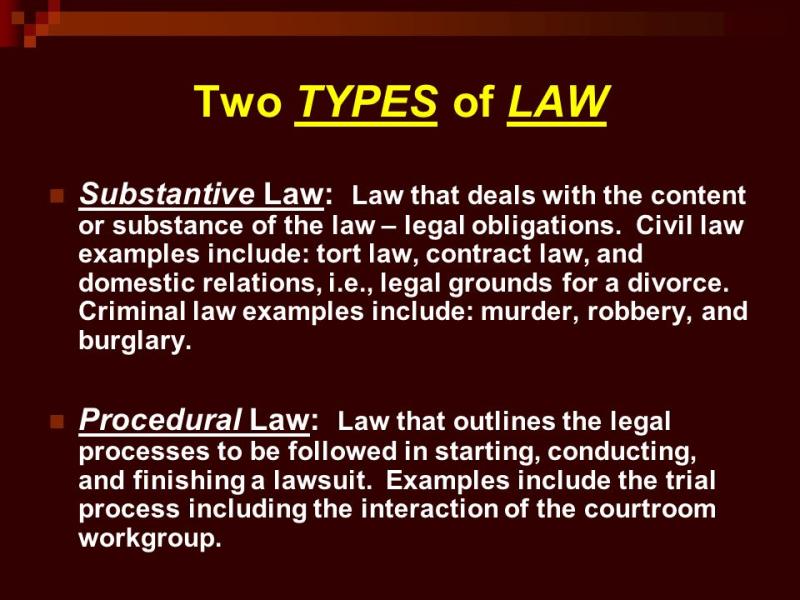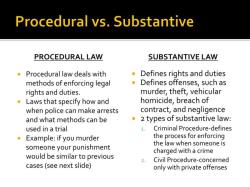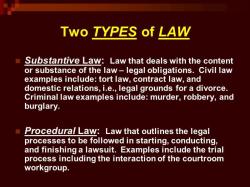Is the procedural law more important than the substantive law?
The importance of procedural law versus substantive law is a subjective matter and largely depends on the context and perspective. Both procedural and substantive law play crucial roles in the legal system, and their significance cannot be easily compared or ranked. Here's an overview of the importance of each:
Importance of Procedural Law:
- Fair Administration of Justice: Procedural law ensures that legal proceedings are conducted fairly, with adherence to due process. It safeguards individuals' rights, providing a framework for a just resolution of disputes.
- Predictability and Consistency: Having clear procedural rules promotes predictability and consistency in legal processes. Parties involved in legal proceedings can anticipate the steps and procedures, fostering a more stable legal environment.
- Efficiency in Legal System: Procedural rules contribute to the efficiency of the legal system by providing structured processes for handling cases. This helps courts manage their dockets and resolve disputes in a timely manner.
- Enforcement of Rights: Procedural law establishes mechanisms for enforcing rights and remedies. It ensures that individuals have access to legal avenues for seeking redress and resolving conflicts.
- Appeals and Review: Procedural law governs the appeals process, allowing for the review of decisions made in lower courts. This contributes to the correction of errors and the development of legal precedents.
Importance of Substantive Law:
- Defining Rights and Obligations: Substantive law defines the rights and obligations of individuals and entities. It establishes the legal standards and principles that govern conduct and relationships.
- Creating Legal Rights: Substantive law creates legal rights that individuals can enforce. It encompasses various areas such as contract law, property law, criminal law, and tort law, providing the foundation for legal claims.
- Legal Accountability: Substantive law establishes the grounds for legal accountability. It identifies what actions or omissions are considered legally wrong and outlines the consequences, including potential liabilities and penalties.
- Regulating Conduct: Substantive law regulates behavior by setting the rules that individuals and organizations must follow. It contributes to the overall order and stability of society by providing a legal framework for interactions.
- Legal Certainty: Clear and well-defined substantive laws contribute to legal certainty. They enable individuals to understand their rights and responsibilities, fostering a sense of security and stability in legal relationships.
In essence, procedural law and substantive law are interdependent, working together to ensure a functioning legal system. While procedural law ensures the fair and efficient administration of justice, substantive law establishes the legal rights and obligations that form the basis for legal proceedings. Both aspects are essential components of a well-balanced legal framework.
Evaluating the relative importance of procedural law compared to substantive law
Evaluating the relative importance of procedural law compared to substantive law is a complex question with no definitive answer. Both branches are crucial to a functioning legal system, but their emphasis shifts depending on the context and perspective. Here's a breakdown of their individual roles and some considerations for comparison:
Substantive Law:
- Defines rights and wrongs: Sets forth the essential rules and principles that govern conduct, determining what is legal and illegal.
- Provides framework for justice: Establishes the standards for legal claims and defenses, outlining the basis for resolving disputes and holding individuals accountable.
- Protects fundamental liberties: Guarantees basic rights and freedoms, ensuring fairness and equality for all individuals within the legal system.
Procedural Law:
- Ensures fair application of substantive law: Establishes the rules and processes for bringing claims, presenting evidence, and resolving disputes in a just and impartial manner.
- Protects due process rights: Guarantees basic procedural safeguards, such as the right to be heard, access to evidence, and a fair trial, preventing abuse of power and protecting individuals from arbitrary proceedings.
- Promotes efficiency and order: Streamlines the legal system by setting clear protocols for each stage of litigation, from pre-trial motions to appeals, ensuring smoother case progression and avoiding procedural delays.
Comparing their importance:
- Interdependence: Both substantive and procedural law are interwoven and interdependent. Substantive law dictates the rights and wrongs, but procedural law defines the mechanisms for realizing and enforcing those rights. Without proper procedures, even the best substantive laws can be rendered ineffective.
- Contextual emphasis: Their relative importance can vary depending on the situation. In a case addressing fundamental rights violations, substantive law might take precedence to ensure justice for the aggrieved party. Conversely, in a complex lawsuit with intricate evidence, procedural rules might be crucial to ensure a fair and accurate outcome.
- Philosophical perspectives: Legal theorists have different views on how these branches should be balanced. Some advocate for prioritizing substantive law as the ultimate goal, while others emphasize the importance of procedural safeguards in preventing injustice and upholding the rule of law.
Ultimately:
- Both substantive and procedural law are essential for a fair, just, and efficient legal system.
- Their relative importance depends on the specific context, purpose, and legal values at stake.
- Understanding their interplay and considering different perspectives is crucial for appreciating the nuanced role each branch plays in upholding the rule of law.
I hope this provides a balanced perspective on the complex question of their relative importance. Feel free to ask further questions for a deeper exploration of specific aspects or legal philosophies within this realm.











